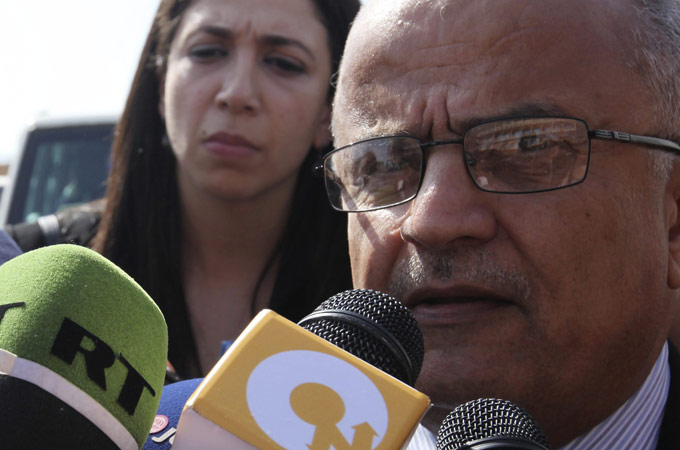Libya blames NATO for raid on food warehouse
Officials claim air strike killed eight people in Zlitan as UN envoy holds meeting with Benghazi-based opposition.

 |
| Abdul Elah al-Khatib, the UN envoy, will travel to Tripoli to meet government officials [Reuters] |
Libyan officials have accused NATO of killing at least eight people in an air raid on a food warehouse and medical clinic in Zlitan, east of Tripoli.
Foreign journalists taken to the town of Zlitan on Monday were unable to verify if it was a NATO operation.
NATO has denied targeting civilians and say it only hit military facilities in the area.
Muammar Gaddafi, the longtime leader, remains in power despite a four-month NATO air campaign and five months of fighting with opposition fighters who have seized large parts of the oil-rich North African country.
Zlitan is the largest city between opposition-held Misurata and government-controlled Tripoli, and remains in Gaddafi’s control.
“We are, generally, in a stalemate,” Michael Mullen, chairman of the US joint chiefs of staff, said in Washington during what could be his last news briefing before retirement.
Mullen said NATO has “dramatically attrited [reduced] his forces” and “additional pressure has been brought”, even if Gaddafi has not been ousted.
“In the long run, I think it’s a strategy that will work … [towards] removal of Gaddafi from power,” Mullen said.
Diplomatic push
The developments came as the Abdul Elah al-Khatib, the UN envoy to Libya, and the Benghazi-based opposition council discussed ideas for ending the fighting.
With a diplomatic push to end the conflict gathering steam, al-Khatib told the Reuters news agency after the meeting on Monday that he would head to Tripoli on Tuesday to hold talks with the government.
| Lawyers in Misurata are building a case against Gaddafi |
“We did not put a plan in front of them. We discussed the views and ideas on how we can trigger a political process … to achieve a political solution,” he said.
NATO has continued to attack Gaddafi’s forces around Libya, striking twice in central Tripoli on Monday, and Britain has said there would be no let up during the Muslim holy month of Ramadan in August.
But hopes have grown for a negotiated end to a war that has dragged on longer than many initially expected.
Speaking to Reuters after the meeting, Mahmoud Jibreel, a senior opposition official, said he had made clear his side would reject any initiative that did not involve the removal of Gaddafi from power as a first step to peace.
That appeared to be a tacit rejection of UN ideas floated informally by a diplomat last week, which envisaged a ceasefire followed by a power-sharing government without Gaddafi.
The UN issued a statement on Monday that said it has identified shortage of fueld, food and cash in areas under Gaddafi’s control.
‘Productive dialogue’
Gaddafi’s foreign minister, Abdelati Obeidi, recently ended three days of talks in the Egyptian capital, Cairo, to seek a negotiated end to the war.
Libya’s government has said its representatives are ready to hold more talks with the US and the opposition, but that Gaddafi himself will not negotiate and will not quit.
Moussa Ibrahim, the Gaddafi government spokesman, said on Friday that senior Libyan officials had a “productive dialogue” with US counterparts earlier this month in a rare meeting that followed US recognition of the opposition government.
Complicating Gaddafi’s situation is the fact that the world court in The Hague is seeking his arrest for crimes against humanity allegedly committed by his forces.
This makes it difficult for him to find refuge outside the country.
Hopes for a negotiated settlement have grown, however, since France said for the first time last week that Gaddafi could stay in Libya as long as he gives up power.
The opposition leaders have given conflicting signals in recent weeks over whether they would allow Gaddafi and his family to stay in Libya as part of a deal, providing he gives up power.
In the latest comment on the issue, opposition leader Mustafa Abdel Jalil told the Wall Street Journal that it would be acceptable.
“Gaddafi can stay in Libya but it will have conditions,” he said. “We will decide where he stays and who watches him. The same conditions will apply to his family.”